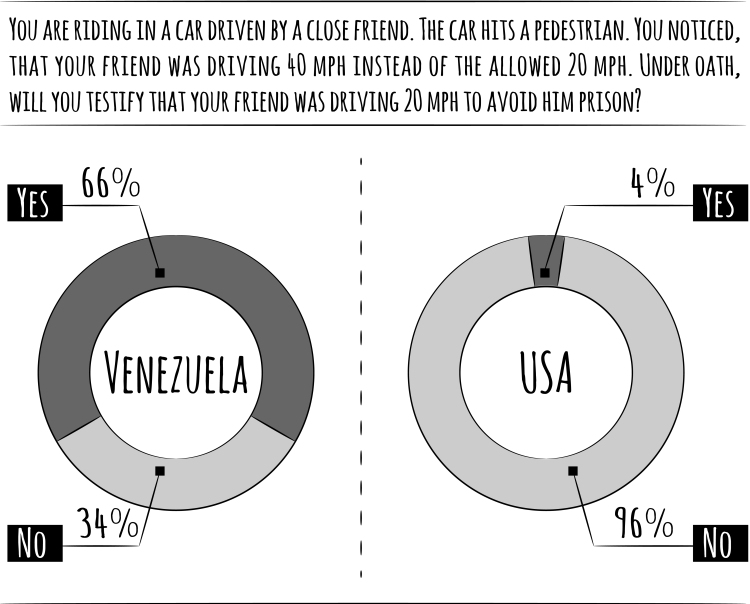A hypothetical scenario:
Your best friend is picking you up to head out on the town. As you head into the city center, you notice your friend is driving quite fast; 40 mph in a 20 mph zone down a crowded street.
You see a pedestrian take a step off the sidewalk ahead of your friend’s car. “Look out!” you shout. But it’s too late. Your friend accidentally hits the pedestrian.
An ambulance is called, paramedics try to save the victim, but he doesn’t make it. He dies on the way to the hospital.
Weeks later, you are called to court as a witness to the fatal accident. You know your friend was driving well over the speed limit, but if you tell the truth, he’ll go to prison. If you lie for your friend, he’ll walk away.
Would you lie? Or would you tell the truth?
Survey: Venezuela vs. USA
This was the exact scenario given in a survey sent to 46,000 managers in 40 different countries in a study by Fons Trompenaars and Charles Hampden-Turner.
As a preface, Hofstede’s cultural dimensions define the US is a rule-based society; Venezuela is a relationship-based society.
Knowing this, which society do you think would choose to be truthful in this matter? And which do you think might lie to protect a friend?
As you can see below, the results were exactly as you’d expect.

96% of American citizens surveyed said that, when confronted with this situation, they would tell the truth and abide by the law. Only 34% of Venezuelans agreed.
The majority of those from the relationship-based society of Venezuela would protect their friend above the law, while the overwhelming majority of Americans would put their societal responsibility before their friend’s fate.
Everyone is Equal in the Eyes of the Law
Western cultures are largely rule-based or “universalist.” Generally, they believe that, in order to be just, established rules and laws should be applied universally.
According to the purest form of justice, all people – friend or stranger, rich or poor, black or white – should be treated equally in the eyes of the law. And, with that perspective, most people in a law-based society would strive toward the rule.
Rules and laws are also seen, more or less, as a black and white matter.
A red light at a pedestrian crossing illustrates the seriousness of law in a rule-based culture.
In Germany or Switzerland – both strict rule-based cultures – place a foot out of line when the pedestrian crossing light is red, and you will see the reaction. Those around you will make it clear – albeit, likely with only a frown – that they’re not happy with your disobedience, albeit likely just with a frown. Even if it’s 2 in the morning.
Laws in a rule-based society are also considered essentially permanent.
For instance, a law that is a law today is unchangeable; it will be the same tomorrow (unless, of course, it’s changed through an often lengthy democratic process that involves party votes and public opinion).
Not even the highest office in the country has the right to change the law in an instant; neither is this highest office immune to the laws.
Beyond the Individual
While rule-based cultures often align with a high degree of individualism, relationship-based cultures walk hand-in-hand with collectivism. This results in a different prioritization of social norms in individualist vs. collectivist cultures.
One Confucian ideal puts this in perspective: care for one’s parents/grandparents comes first; then comes care for one’s children; then, for oneself.
Collectivists see human existence as reaching beyond the individual; rather an individual’s existence is a symbiotic relationship with extended family, the tribe, the village, society. One’s connection to others is part of his/her existence. Existing apart from this is a form of death.
As such, relationships are highly important; oftentimes, more important than rules. The alternative is ostracism which is, again, death.
Imprisonment is a form of ostracism. Should you confess that your friend broke the law, thereby sending him to prison, you are virtually putting him to death.
In this way, you can see the stark and dramatic difference the truth would make in this matter.
In this way, you can see the difference in perspective between relationship-based and rule-based cultures.
In this way, you might begin to understand motivations across cultures.
